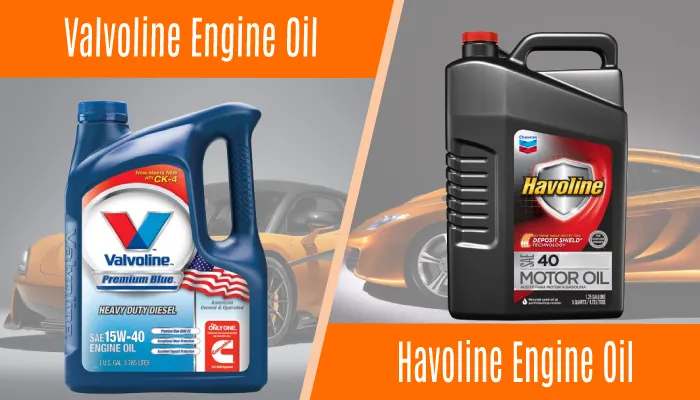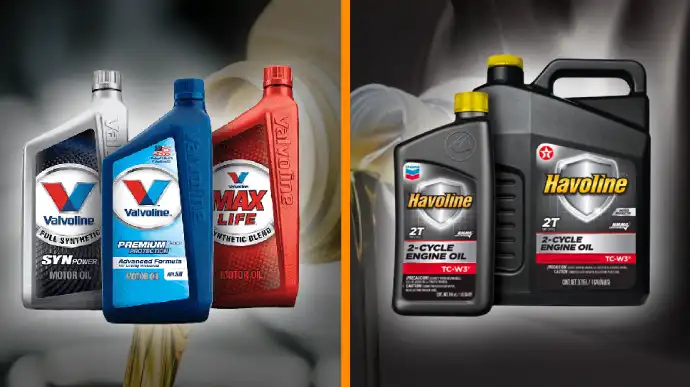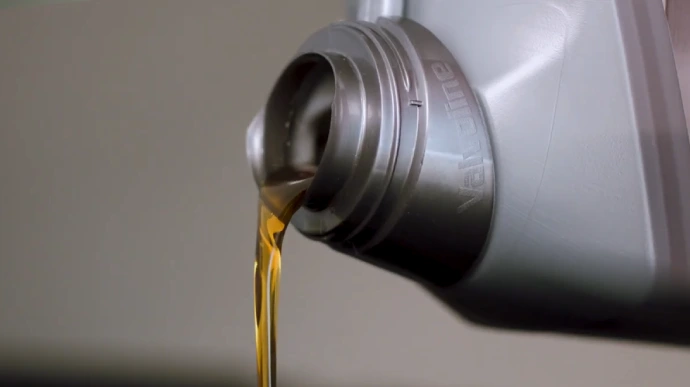Physical Address
304 North Cardinal St.
Dorchester Center, MA 02124
Physical Address
304 North Cardinal St.
Dorchester Center, MA 02124

A choice of the right engine oil for your vehicle is a critical decision that can significantly impact its performance, longevity, and maintenance. Valvoline and Havoline are two prominent names in the automotive lubricants industry, each offering a wide range of engine oil products.
Valvoline often combines synthetic and conventional base oils in their formulations, offering a balance between performance and cost-effectiveness. In contrast, Havoline predominantly uses synthetic base oils, prioritizing high-performance and enhanced protection.
While both brands aim to provide superior protection and performance, they do so with distinctive formulations, features, and advantages.
Here, we’ll explore the differences between Valvoline and Havoline engine oil. You’ll discover why Valvoline is a top-notch product and how it compares to Mobil 1. Plus, we’ll reveal whether Valvoline oil is suitable for your Mercedes.

In comparing Valvoline and Havoline engine oils for vehicles, a few key differences should be noted.
Valvoline engine oils are typically formulated using a combination of synthetic and conventional base oils. This blend allows Valvoline to offer a cost-effective option for consumers.
Conversely, Havoline primarily relies on synthetic base oils in their engine oil formulations. Synthetic base oils are known for their superior performance and protection properties.
Valvoline has a range of specialty oils, including their ‘High Mileage’ oil specifically designed for vehicles with over 75,000 miles. This oil contains additives that help reduce oil consumption, minimize leaks, and prevent engine wear.
Furthermore, Valvoline offers ‘Full Synthetic with MaxLife Technology’ oil, which is ideal for vehicles with high mileage and revitalizes aging engines.
On the other hand, Havoline provides specialty formulations such as their ‘Deposit Shield’ oil, formulated to prevent harmful deposits from forming in the engine. They also offer the ‘ProDS’ synthetic oil, which provides exceptional protection against engine wear and ensures optimal performance in extreme conditions.
To differentiate between Valvoline and Havoline engine oil for vehicles, consider the variances in their additive packages.
Valvoline engine oils are formulated with a strong emphasis on detergents and dispersants. These additives effectively clean the engine by removing deposits and preventing the formation of sludge and varnish. By keeping the engine clean, Valvoline helps maintain optimal engine performance and efficiency.
On the other hand, Havoline engine oils prioritize anti-wear additives and corrosion inhibitors. These additives provide an extra layer of protection for the engine components, reducing friction and wear. Additionally, they help prevent rust and corrosion, prolonging the life of the engine.
Viscosity refers to the oil’s resistance to flow, and it plays a crucial role in protecting your engine.
Valvoline offers a broader range of viscosity grades, providing more options to suit diverse climates and vehicle applications. They’ve both single-grade and multigrade oils, with single-grade oils being suitable for older vehicles or specific applications.
Alternatively, Havoline may have a more limited range of viscosity grades but offers specialized solutions for specific performance requirements.
Valvoline’s conventional oil options are specifically designed to provide excellent protection and lubrication for older engines. These oils are formulated with additives that help prevent wear and reduce friction, which can be beneficial for engines with higher mileage.
Then again, Havoline’s synthetic blends may not be as well-suited to older engines. Synthetic oils are generally formulated for modern engines that have tighter tolerances and higher operating temperatures.
While they can still provide adequate lubrication, they may not offer the same level of protection and performance as Valvoline’s conventional oils for older vehicles.
Valvoline offers a range of conventional and synthetic-blend oils that typically require more frequent oil changes, usually every 3,000 to 5,000 miles. This is because conventional and synthetic-blend oils tend to break down faster and accumulate more contaminants over time.
On the other hand, Havoline’s synthetic oils have longer oil change intervals. Some synthetic formulations can last up to 10,000 miles or more before needing to be changed. This is because synthetic oils are engineered to have better resistance to breakdown and to provide superior protection against wear and deposits.
To improve your vehicle’s fuel economy, consider the differences in engine oil options between Valvoline and Havoline.
Valvoline’s emphasis on cleanliness and detergency may lead to slight improvements in fuel economy. Their engine oil is designed to keep the engine clean, reducing friction and improving overall efficiency. This cleaner engine allows for smoother operation and better fuel combustion, resulting in better fuel economy.
Conversely, Havoline’s engine oil is formulated with anti-wear additives that enhance engine efficiency. These additives reduce friction between moving parts, minimizing energy loss and improving fuel economy.
While Valvoline may have a slight advantage in terms of cleanliness and detergency, Havoline’s anti-wear additives can offset this advantage by improving engine efficiency, ultimately leading to similar fuel economy results.
Havoline’s use of synthetic base oils and focus on high-performance formulations may result in a reduced environmental footprint compared to Valvoline’s conventional blends.
Synthetic base oils, derived from chemical synthesis, offer improved performance and stability, resulting in reduced oil consumption and fewer oil changes. This leads to less waste generation and lower disposal requirements.
Additionally, Havoline’s high-performance formulations are designed to minimize friction, which can enhance fuel efficiency and reduce greenhouse gas emissions.
On the other hand, Valvoline may have a slightly higher environmental impact due to its use of conventional blends. However, it’s important to note that the overall environmental impact of both brands can vary depending on their specific product lines and manufacturing processes.
Valvoline is often preferred by consumers looking for a more budget-friendly option. Its affordability makes it accessible to a wider range of vehicle owners.
In contrast, Havoline’s synthetic formulations can be pricier. The advantages of synthetic oils, such as better engine protection and longer oil change intervals justify the higher cost.
Availability of both brands may vary by region. Local markets can dictate which brand is more accessible to consumers. It’s important to check with local retailers or online suppliers to determine the availability of Valvoline or Havoline engine oil in your area.

Valvoline is a good product for your vehicle. Valvoline is well known in the automotive industry because it manufactures high-quality motor oils that provide optimal performance and engine protection.
With Valvoline motor oils, advanced additives and base oils meet or exceed industry standards, ensuring superior lubrication and minimizing engine wear. These oils undergo rigorous testing to perform well under various conditions, maintaining engine cleanliness and preventing sludge formation and deposits.
Valvoline also offers a wide range of motor oils, including synthetic, synthetic blend, and conventional options, catering to different engine needs and preferences.
In terms of wear protection, Valvoline SynPower has been proven to outperform Mobil 1 in tests conducted using the 5W-30 grade. Multiple tests have shown that Valvoline SynPower provides four times better wear protection than Mobil 1.
This means that Valvoline SynPower can help to minimize engine wear, extending the life of your engine and improving its overall performance. Additionally, Valvoline SynPower is formulated with advanced additives that offer excellent protection against oxidation, deposit formation, and thermal breakdown.
Valvoline oils are indeed good for Mercedes vehicles. Valvoline’s full synthetic motor oils are designed to meet the requirements of high-performance European cars, including Mercedes Benz. These oils are API licensed, which ensures their quality and performance for North American vehicle applications.
Valvoline oils carry specific OEM approvals from renowned automotive brands such as Mercedes-Benz, Volkswagen, Porsche, and BMW. This means that they’ve been tested and approved by Mercedes Benz for use in their vehicles.
Havoline 5w30 is a synthetic engine oil that meets the Ford WSS-M2C913-D and Renault RN 0700 engine lubrication requirements. It’s a proven performance fuel, efficient synthetic oil specially formulated with advanced additive technologies.
This oil is designed to provide excellent protection for your engine, ensuring smooth operation and optimal performance. The synthetic formulation offers superior lubrication, reducing friction and wear on engine components. Aside from its excellent temperature stability, it can handle extreme cold and heat well.
As you can see, regarding choosing between Valvoline and Havoline engine oil for your vehicle, both brands have unique qualities. The differences outlined in this comparison offer a comprehensive overview of what each brand can provide, regardless of your priorities.
You should choose between Valvoline and Havoline based on your vehicle’s needs, driving habits, and the environment. By carefully evaluating these distinctions and considering the factors that matter most to you, you can make an educated decision that enhances your vehicle’s performance and longevity.
Regardless of your choice, regular oil changes and proper maintenance remain fundamental for keeping your vehicle running smoothly.